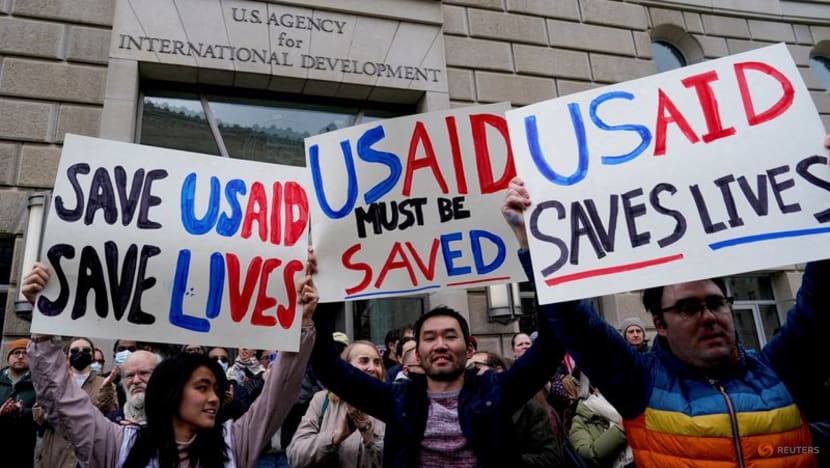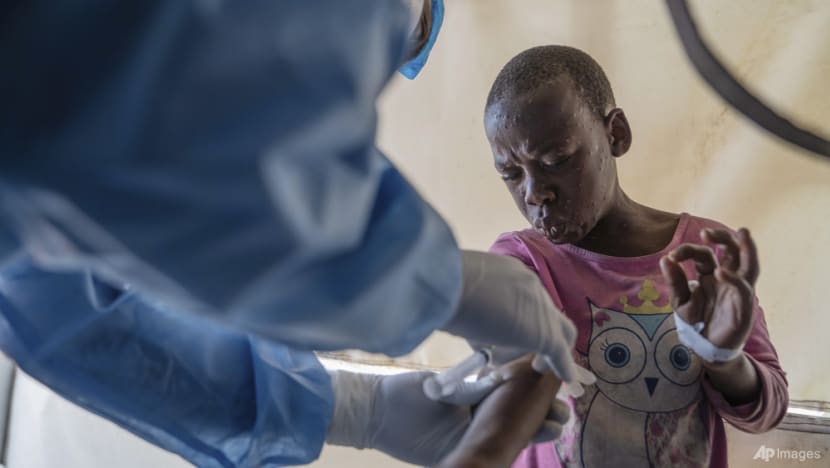Trump's foreign aid cuts hinder Africa’s response to disease outbreaks
African nations are battling rising disease threats with limited resources, following a freeze on funding from the United States.

FILE PHOTO: People hold placards, as the USAID building sits closed to employees after a memo was issued advising agency personnel to work remotely, in Washington, D.C., U.S., February 3, 2025. REUTERS/Kent Nishimura/File Photo

This audio is generated by an AI tool.
KAMPALA, Uganda: Foreign aid cuts imposed by United States President Donald Trump’s administration have hampered programmes that help to keep dangerous pathogens in check and prevent outbreaks around the world.
This comes as outbreaks of diseases such as mpox and Ebola are on the rise.
Global health experts told CNA that infectious diseases often defy borders.
They stressed how a decision made in one part of the world can have health ramifications elsewhere, regardless of where the outbreak originates.
TRUMP'S USAID FREEZE
Uganda, for instance, is in the midst of its sixth outbreak of the Sudan virus disease, a severe and potentially fatal viral hemorrhagic fever belonging to the same family as Ebola.
Since the start of the year, there have been 12 confirmed cases with two fatalities.
But unlike previous outbreaks, Uganda currently has fewer resources compared with then. Labs are stretched thin, and health teams are struggling to cope.
“Many of us are very much aware that our partners are withdrawing, so partner funding is dwindling. The best message ever is prevention,” said Ugandan Health Minister Jane Ruth Aceng.
“All of us must rise to the fact that we must prevent.”
In January, the US government under President Donald Trump announced a near-total freeze on United States Agency for International Development (USAID) programmes in a bid to slash overseas spending. The agency was established in 1961 to better coordinate foreign assistance.
Its impact was almost immediate on Africa, including its battle against hemorrhagic fevers.
In Tanzania, the Marburg virus, a severe and often fatal hemorrhagic fever, has killed 10 people.
Experts fear that viral outbreaks like this may emerge and spread at a time when US assistance and information-sharing are no longer accessible.
“What might start as a pandemic here can easily spread to other parts of the world – as we saw with the COVID-19 pandemic,” said Moffat Nyirenda, professor of medicine at the London School of Hygiene and Tropical Medicine.
“So, being too territorial in thinking of ‘only our country’ might look fine in the immediate terms but in the long term, it is potentially very risky.”
RISK OF GLOBAL PANDEMIC
That risk can be observed in the multi-country Mpox outbreak in Africa.
Uganda, for instance, has registered more than 4,900 confirmed Mpox cases so far this year, with more than 30 deaths reported, according to the World Health Organization (WHO).
“At first, I thought I had chicken pox or measles, so I went to a clinic,” recalled Ugandan mpox survivor Sheila Asiimwe.
But she said the doctor turned her away and told her to seek treatment at a larger medical facility.
“This scared me. At home, my neighbours stayed away from me. All my workmates, friends, and clients shunned me. I felt victimised and alone,” she added.
Elsewhere, the Democratic Republic of Congo (DRC) has it worse. More than 16,000 cases have been confirmed, with at least 40 deaths reported, according to reports.
The Africa Centres for Disease Control and Prevention warned that the true toll may be far higher due to gaps in disease monitoring and lab testing.
“When it comes to humanitarian response in the DRC, US funding is a big part of it,” said Boureima Hama Sambo, WHO representative to the DRC.
“So you can imagine how this can directly or indirectly affect responses on the ground.”

Mpox cases are largely concentrated in African countries, but are not limited to the continent.
Scientists from the University of Surrey said virus mutations are increasing its severity, raising the risk of a global pandemic.
Observers said the mpox outbreak is not just Africa’s problem, but a global one.
In the US, mpox cases have been confirmed in at least three states so far this year — Georgia, New Hampshire and New York — from people who had visited Africa.
Travel-associated cases have also been reported as far away as in Brazil, Canada, China, Sweden, and Thailand.
















